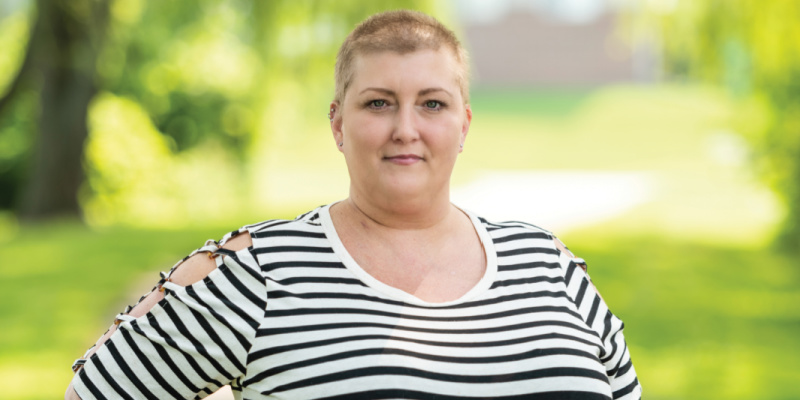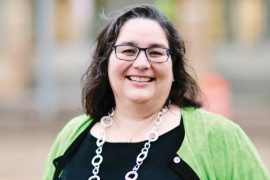By Shelby Rowe Moyer | Photography by Shalicia Johnson
The questions Samantha Peterson hears about her experience with cancer can be frustrating. She fields comments like: “At least you don’t have some other type of cancer. The breast cancer you have isn’t that bad.” Or: “You’ll be fine! You look great! You don’t look like you’re sick.”
Cancer is cancer, she says. No matter what kind you have, it’s still a hard thing to go through.
Peterson, a Madison resident, was diagnosed with triple-negative breast cancer in 2018 and underwent roughly five and a half months of treatment. At first, she felt guilty about how few side effects she was experiencing. But then, after several rounds of chemotherapy, she developed a low white blood cell count and neuropathy (numbness and weakness in the fingers and toes) and had to stop the regimen early.
The 32 rounds of radiation that followed caused painful and debilitating burns, and her skin continues to feel tight and achy where she was treated. Her lumpectomy (a procedure that removes a portion of the breast tissue) resulted in dramatically uneven breasts. A breast reduction on her right side made her chest a little more symmetrical, but she says all of the scarring and deformation makes her self-conscious.
Peterson has vision and hearing loss, body pain and fatigue. One of the worst drug-induced effects, however, is the memory loss, she says.
“Even to this day my chemo brain is so bad,” Peterson says. “My house is surrounded with white boards and sticky notes. I’ve got reminders on my phone. It’s terrible. I mean, chemo brain is a big one.”
Peterson didn’t fully realize how much of her old self she had lost until she fell asleep one day — a few months after she finished treatment — and was late picking up her kids from school. It was that moment that she knew she would never have her old self back. Her chapter on cancer will never truly close, she says, because its after-effects are probably a permanent part of her life.
“I get annoyed with people when they’re like, ‘Oh, you’re done with treatment? You’re all good now? You’re all better?’” she says. “And I’m like, I’m the furthest from better. If anything, I’m worse.”
AFTER IT’S OVER
A diagnosis of cancer doesn’t end when treatment ends, and the mental after-effects can be just as distressing. In fact, cancer psychologist Lori DuBenske — senior psychologist at UW-Madison’s Department of Psychiatry and a practitioner at UW’s Carbone Cancer Center — says many of her clients are referred to her post-treatment. Having a cancer diagnosis is hard, but it also comes with a plan and regular monitoring.
“When you finish cancer treatment, you kind of lose that safety net,” she says. “It comes with much more ambiguity. It’s a time of uncertainty; of concern about it not being watched as much. The security that came from doing something about the cancer is no longer there.”
Two of the biggest themes for cancer survivors that can lead to distress, anxiety or depression are uncertainty and loss. Uncertainty often unfolds in the form of nagging questions — will the cancer come back; how long do I have to live; will these symptoms go away? The uncertainty often stokes fear, worry and panic, DuBenske says.
And then there are feelings of loss and mourning, she adds. Some are permanent effects. Some women have lost their breasts or the original shape of their breast(s). Some have lost their fertility. And then there are some effects that can be temporary, like hair loss or the inability to maintain a career or social life at the same level as before.
So, when working with patients, DuBenske says cancer psychologists often use a biological-psychological- social approach — addressing the biological changes caused by cancer treatment and the psychological effects of having cancer and going through treatment. In terms of social factors, DuBenske says she also examines how the reactions of friends, family and co-workers might be impacting cancer patients as well.
The emotions can be complicated, DuBenske says. It’s common to feel worried and anxious after treatment, and some have guilt about those feelings with thoughts like, “I’m alive. I’m done with treatment; shouldn’t I feel good about that?”
“We’re able to let them know that their distress is normal,” DuBenkse says. “They can let go of their judgment, and then they’re able to feel what they’re feeling and move through that. When you go through this experience, there’s some necessary sufferings that are going to happen. There’s some necessary physical suffering. There’s necessary emotional suffering. Our job as cancer psychologists is to reduce any unnecessary suffering [like fears about the future].”
Peterson echoes many of Dubenske’s patient’s experiences. She says her transition out of treatment was tough. Because her chemotherapy treatment ended abruptly, she never got to say goodbye to the team that was taking care of her. She went from seeing her oncologist frequently to once every few months for checkups. If she wasn’t feeling well, Peterson was told to see her primary care doctor.
Peterson says she felt like her whole safety net disappeared. “I was forgotten,” she says about the sudden drop-off of support. “That’s exactly how I felt.”
The transition after treatment would have been made easier physically and emotionally if there was a structured post-treatment plan, Peterson says — one that set her with ongoing care, like support groups, a therapist, physical therapy and pain management.
Shortly after being diagnosed, Peterson started attending a support group through Gilda’s Club Madison, a cancer support community for anyone battling the disease or survivors (whether it’s themselves or a loved one). She says it was the best thing she did for herself. Being surrounded by other people who know what she’s been through — because they’ve experienced it too — was incredibly healing and validating.
Peterson says based off of her experience, although a cancer survivor may not “look sick anymore,” someone in the post-treatment phase may be navigating invisible struggles. She says if someone in your life is going through this, showing up for them when they need help or simply listening can be a huge help.
Unfortunately, Peterson was recently told that her cancer returned as metastatic breast cancer, and she’s going through treatment again. To other women going through this, she wants them to know that “you’re not alone. You’ve got to find a group, even if it’s online. Find people you can talk to, because you’re definitely not alone.”




